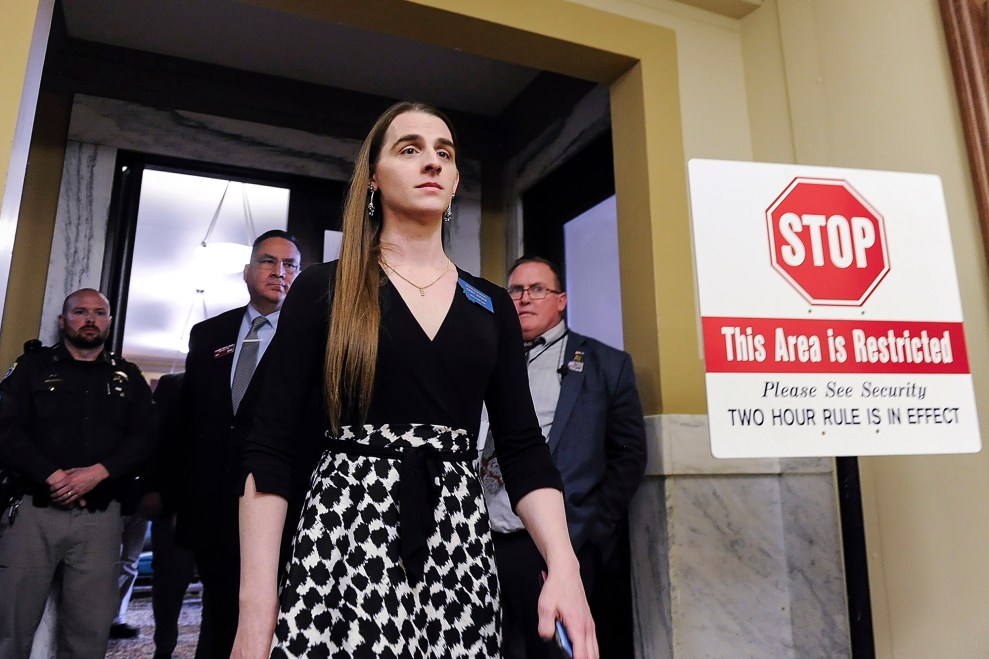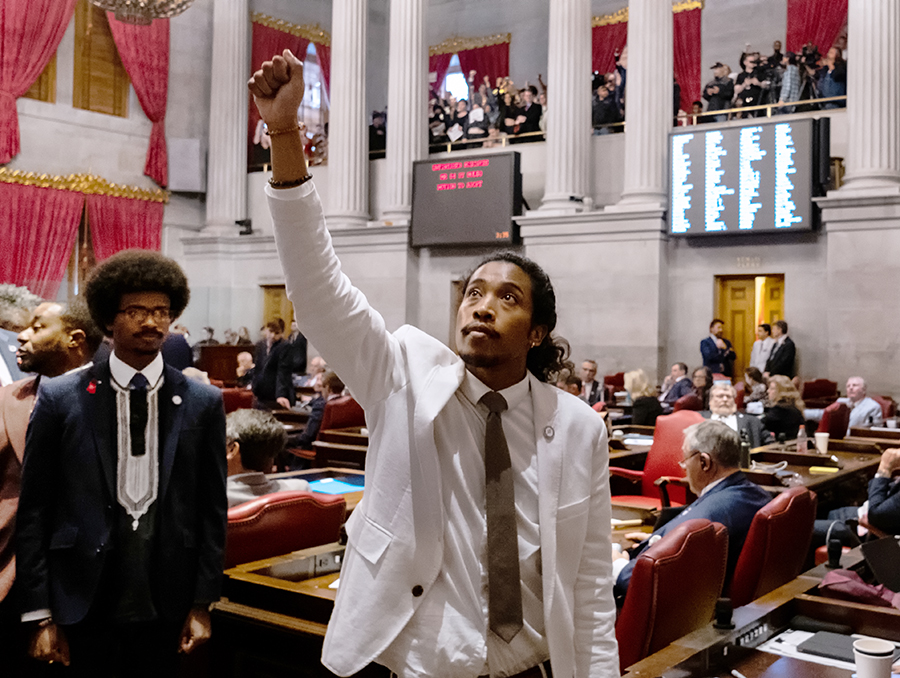Zooey Zephyr was tired of watching Montana’s Republican-controlled legislature pass laws targeting trans residents, so last year, the 35-year-old Missoula native decided to join the chamber herself. She ran for an open seat and was elected with 79 percent of the vote. “If you wanna make a difference, get in that room,’” Zephyr recalled a fellow Democrat telling her, in a 2022 interview. “So I’m getting in that room.”
She stayed there until April, when her colleagues threw her out.
Zephyr’s trouble began this spring, when Republicans pushed a new measure to ban gender-affirming care for minors. In a floor speech, she warned that colleagues who backed the bill would “have blood on [their] hands” if it passed. When protestors in the gallery expressed support for Zephyr, the Democrat held up the microphone to amplify their dissent. Republicans, accusing her of “encouraging an insurrection,” barred Zephyr from speaking. In fact, they barred her from entering the chamber at all. She can vote, but only remotely. Zephyr is effectively banished from the legislature—and so, by extension, is the young, liberal, urban community she represents.

Rep. Zooey Zephyr has been banned from the Montana legislature’s floor.
Thom Bridge/Independent Record/AP
But Zephyr and her constituents are not the only ones being silenced. In red states across the country, legislatures and governors are moving to curb the power of blue municipalities and other institutions that don’t fall in line; erase the voting power of non-Republicans; expel the people those communities elected; and strip them of redress. It is a war on local control—a challenge to the agency of public-school systems, district attorneys, ballot initiatives, and even the kinds of corporate fiefdoms that Republicans might otherwise sanctify. These crackdowns are part of a broader story in national politics that has gained new traction in the Trump era to cast liberal governance, and Democratic dissent, as not just wrong but illegitimate.
It’s happening all over. A few weeks before Zephyr learned her fate, Republicans in Tennessee voted to expel two Black state representatives, from Memphis and Nashville, for staging a protest in support of gun reform. Republican lawmakers in Georgia, who have already taken steps to disempower county election boards, are laying the groundwork to fire the democratically-elected district attorney in Fulton County, just as Republicans in Pennsylvania previously pushed to oust the recently reelected chief prosecutor in Philadelphia.
Even Republicans inside the Beltway seem more inclined to meddle in local politics than debate federal policy these days. Ohio Rep. Jim Jordan’s House Judiciary Committee recently held a field hearing in Manhattan, purportedly to better understand the crime problem in one of America’s safest cities, but really to apply more pressure on the borough’s district attorney, Alvin Bragg, for his prosecution of Trump. Congress recently overturned a Washington, DC, law that revised sentencing guidelines for certain criminal offenses (some Democrats caved and backed the Republican-led effort). “All politics is local” doesn’t mean the same thing it used to.
Cities have long been a conservative punching bag, but this particular crusade is part of a rhetorical and political shift by Republicans in recent years. In the Obama era, conservatism was defined by a robust federalism that tied into longstanding, often euphemistic, appeals for states’ rights and local control. Stoking fears of Big Government, Republicans achieved a historic redistribution of power through the twin forces of state capitals and the courts. A newly emboldened cohort of Republican attorneys general—thrust into office via an unprecedented gusher of dark money and corporate cash—used friendly courts to eat away at the federal government’s power to legislate. On health policy, environmental regulations, and democracy itself, legal victories empowered state capitals to make their own rules—in some cases gutting longstanding laws, such as the Voting Rights Act.
The intellectual heart of this anti-Washington backlash was Texas, where Gov. Rick Perry talked aimlessly about secession and published a manifesto called Fed Up!, and where then-AG Greg Abbott once described his job as, “I sue Barack Obama, and then I go home.” Abbott’s successor, Ken Paxton, is still suing the feds, and the anger over “Biden’s Border Crisis” is probably the closest thing Republicans have to a federal political issue that they actually want to talk about. But the principal target in Texas these days isn’t Washington; it’s big Democratic cities and the things they stand for, and liberal educators and bureaucrats, and the things they stand for.
Just consider the focus of the most recent legislative session. When lawmakers weren’t scouring libraries for objectionable material and debating whether Lonesome Dove was fit for teens, they were taking aim at the power of communities to govern themselves. The state senate passed a bill empowering the secretary of state to overturn election results in heavily Democratic Harris County (which includes Houston), while the state house of representatives approved an Abbott-backed measure that would stop municipalities from enacting labor regulations that go further than the state’s own. Among the existing rules that would be tossed, the Texas Tribune reported, was a provision in Dallas guaranteeing water breaks for construction workers. Preempting the power of local authorities has become a semi-annual tradition. An earlier law banned municipalities from acting as “sanctuary cities”—an effort embraced by Republican legislatures in other states, including North Carolina.
Conservatives haven’t soured on local control writ large—just ask a MAGA sheriff what he thinks about enforcing gun laws. It is more of a principled opposition to control by the wrong locals. When a Travis County jury convicted Daniel Perry in April of murdering a Black Lives Matter demonstrator at a protest in Austin in 2020, Abbott quickly signaled his intention to pardon the shooter. He has spent years attempting to humiliate one of the state’s fastest-growing metros and curb its powers, even threatening to take over the Austin police department. It might seem a little dissonant for a governor to rush to the defense of a convicted murderer, at the same time that Republican legislators are pushing legislation to fire DAs for being soft on crime, but only if you haven’t been paying attention. Daniel Perry isn’t the villain of Abbott’s story—Austin is.
Nowhere is this effort to delegitimize home rule more explicitly stated than in the nation’s capital, where members of Congress who openly despise the city and its residents have vigorously resisted efforts to let Washingtonians govern themselves or elect a representative with voting power. (The District has some autonomy, but no representation in Congress, which has veto power on local rules). Opponents of DC statehood often invoke constitutional questions, but the opposition to resolving those constitutional questions is often rooted in a condescension to people who live there.

Congress ignored Washington, DC, Mayor Muriel Bowser’s request not to override a new city law.
Tom Williams/CQ-Roll Call/Getty
“Would you trust Mayor Bowser to keep Washington safe if she were given the powers of a governor?” Sen. Tom Cotton (R-Ark.) asked during a debate over statehood in 2020. “Would you trust Marion Barry?”
It was not especially subtle, but this stuff often isn’t. Self-governance is a power that those people just can’t be trusted with, Cotton argued then, and because their inability to self-govern would affect everyone else, it was only appropriate that some higher authority—the famously high-functioning United States Congress—keep a tight grip on the leash. DC is the extreme example that clarifies the relationship between conservative governance and blue, urban constituencies; it has for decades been a model for the pernicious paternalism they’re increasingly deploying everywhere.
Cities are the enemy in this fight, filled with the sorts of people that the conservative political project exists to other. Their voters are challenged, their representation is curbed. But in many states, the push to consolidate control in state capitals is disenfranchising the electorate as a whole. In Ohio, Republican legislators are currently trying to change the state’s 111-year-old constitutional amendment process, to require a 60-percent supermajority for ballot initiatives. The impetus is pretty clear: Supporters of reproductive freedom want to enshrine abortion rights in the state constitution, just like voters in neighboring Michigan did last year—and there’s a very good chance it’s what the people want.
At least Ohio is trying to change the rules before votes are cast. In 2018, Florida voters overwhelmingly passed Amendment 4, which ended a felon-disenfranchisement policy that blocked 1.4 million residents from voting. But Gov. Ron DeSantis and the Republican-controlled legislature quickly moved to gut the measure. Other states have moved to roll back successful ballots initiatives to raise the minimum-wage and expand Medicaid. Missouri Republicans are pushing a tweak to their process to require referendums to clear 57 percent of the vote, or win in a majority of congressional districts—which, by design, cluster Democrats into as few seats as possible. In 2020, after voters passed an initiative to legalize medical marijuana, Mississippi got rid of its ballot amendment process entirely. These changes are often presented with a neutral air, as efforts to protect the process from the whims of special interests, but the effects are clear: They’re disempowering everyone outside the statehouse and denying communities the agency they once had.
Just as tea partiers once showed their bona fides by clashing with Washington, Republicans are now using fights with local authorities to impress voters and get themselves in front of cameras. They are owning the libs, one petty power grab at a time. DeSantis, for instance, has spent the last year attempting to strip Disney of its special tax status and self-governance powers, as payback for the company’s criticism of an anti-gay law he signed. When Disney preempted the move, and added a new rule stipulating that it would remain in control of its domain until—this is really what it says—21 years after the death of the last descendant of King Charles III—DeSantis announced that he was considering new options to bring the company to heel, perhaps by redeveloping a nearby piece of land.
“Someone even said, like, maybe you need another state prison,” he said.
It is weird, and possibly not ideal, that there’s a 25,000-acre magic kingdom in Florida that effectively governs itself. But DeSantis isn’t going to bat for small-d democracy. In March, he took the rare step of firing a democratically elected district attorney from Tampa, who had told constituents he would not prosecute anyone for seeking an abortion. The firing might not hold up in court. But it was enough to get him on Fox News.

State Reps. Justin Pearson and Justin Jones were expelled from the Tennessee House.
Seth Herald/Getty
Not long after the Tennessee expulsions, the online outlet TN Holler published leaked audio from a closed-door GOP caucus meeting in which members discussed the recent events.
“The left wants Tennessee so bad, because if they get us, the Southeast falls, and it’s game over for the republic,” GOP Rep. Scott Cepicky said on the tape.
The votes merely made official what many Republicans there had already decided: the state’s largest cities were their adversaries, and their power must be blunted at all costs. As in Texas, the legislature has worked to curb the authority of blue cities, and it has manipulated the democratic process to silence their voices. The state’s largest cities sent their expelled representatives back to the chamber almost immediately. But Cepicky and his colleagues had won, even after they’d lost. Nashville could choose its state legislator, but after redistricting, its voters can’t choose their congressman. The city’s residents were siphoned off into three different Republican districts; they have no representative anymore.








